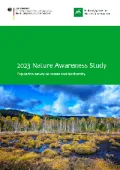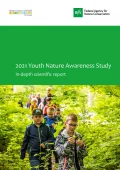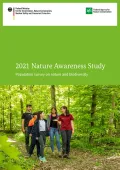Nature Awareness
Nature Awareness Study 2023
The need to restore ecosystems and the importance of natural climate protection are firmly established in the public consciousness. This is shown by the nationally representative Nature Awareness Study 2023 recently published by the Federal Ministry for the Environment (BMUV) and the Federal Agency for Nature Conservation (BfN). The publication – the eighth in a series of studies conducted once every two years since 2009 – provides a direct comparison of data on awareness among adults and young people. A total of 2,411 adults aged 18 and over and 1,003 young people aged 14 to 17 were surveyed. The surveys took place from late October to mid-December 2023. The results are representative of the German population. In addition to monitoring changes in awareness by the inclusion of repeat questions, new topics of relevance to nature conservation policy were also addressed. The main focus of the new study is on natural climate protection and the restoration of ecosystems. The study also looks at the topics of wilderness and water, people’s willingness to support a transformative change towards sustainable and nature-compatible ways of living and doing business, general commitment to nature conservation, people’s personal relationship to nature, the energy transition and genetic engineering, and the updating of the ‘awareness of biodiversity’ societal indicator.
Selected findings:
- Awareness that transformative change is needed in order to tackle the nature, environment and climate crises has increased significantly among the population. In 2023, almost three-quarters of adults were either very convinced or at least somewhat convinced of the urgency of such change (“yes” and “somewhat”: 74 percent), significantly more than in 2021 (60 percent). The majority (two-thirds) of adolescents aged 14 to 17 also see the need for transformative change, albeit with a lesser rate of change between the surveys (2023: 66 percent; 2021: 64 percent).
- The poor state of many ecosystems in Germany is endangering the animal and plant species that depend on such habitats. The Nature Awareness Study shows that the German population is aware of this. The majority believe that the state of nature and the landscape has deteriorated over the past 20 years. The number of people who perceive this to be the case is growing: Currently, 53 percent of the adult population see a deterioration – in 2021 it was 50 percent and in 2011 just 27 percent.
- Accordingly, 85 percent of adults and 80 percent of adolescents strongly agree or at least somewhat agree that ecosystem conservation and restoration are a priority societal challenge.
- With a view to the consequences for their personal lifestyle, 53 percent of adults and 59 percent of adolescents are significantly or at least somewhat alarmed about the climate crisis and the destruction of nature.
- People in Germany are also in favour of state-funded programmes to implement natural climate protection in habitats. Here, 88 percent of adults and 84 percent of adolescents strongly agree or at least somewhat agree.
- In the context of climate change, wilderness areas are ‘laboratories’ in which people can learn how nature adapts to new climate conditions. The designation of wilderness areas as outdoor laboratories is fully or at least somewhat supported by a good three quarters of the population (79 percent) and young people are even more likely to share this opinion (84 percent).
- A clear majority of the population are in favour of nature conservation receiving adequate financial support from government, even in times of crisis. 83 percent of adults and 78 percent of adolescents are fully or at least somewhat in favour of this.
- The ‘awareness of biodiversity’ indicator, which measures people’s willingness to change their behaviour as well as the associated psychological motivating factors, has risen from 25 percent in 2021 to 38 percent in 2023 – a substantial increase of 13 percent.
weiterführender Inhalt
2021 Youth Nature Awareness Study - In-depth scientific report
The German Federal Agency for Nature Conservation has published in-depth scientific analyses on the 2021 youth nature awareness. Results are based on a representative survey of nature awareness among young people aged 14 to 17, which was conducted on behalf of the Federal Ministry for the Environment, Nature Conservation, Nuclear Safety and Consumer Protection and the Federal Agency for Nature Conservation as part of the 2021 Nature Awareness Study. A direct comparison with the findings on awareness of adults has already been published via the basic data brochure "2021 Nature Awareness". In addition, this in-depth report presents comparisons between different socio-cultural subgroups of youth (age, gender, level of education, etc.) and adolescent lifeworlds (SINUS youth milieus), as well as some new topics that were not included in the adult survey.
Key findings include:
- A narrow majority of young people believes that they are personally able to do something for the protection of nature and the climate (54 percent, of which 18 percent "completely agree", another 36 percent "rather"), but that more can be achieved together as a collective (70 percent, of which 33 percent "completely agree", another 37 percent "rather"). The belief that more can be achieved together is particularly prevalent among girls (75 per cent) and young people with a high level of formal education (76 per cent), and weaker among boys (65 per cent) and young people with a low level of formal education (58 percent).
- Support for the energy transition remains high, with a clear "yes" from 64 percent of young people in 2021 (first survey in 2020: 66 percent). Full support for the energy transition is related to the level of education (low: 57 percent, medium: 56 percent, high: 70 percent), and also to place of residence size: Interestingly, approval is highest among young people in rural areas, where production of renewable energies is present in everyday life (less than 20,000 inhabitants: 74 percent), and lowest in large cities (100,000 to 500,000 inhabitants: 57 percent).
- Adolescents are clearly aware of the decline of insects both worldwide and for Germany (worldwide: 76 percent, of which full agreement: 45 percent, rather: 31 percent; for Germany: 70 percent, of which full agreement: 40 percent, rather: 30 percent). The perception of insect decline is expressed more frequently by adolescents with a high level of formal education (both levels of agreement, worldwide: 80 percent; Germany: 75 percent) than by young people with low education (worldwide: 65 percent; Germany: 58 percent).
weiterführender Inhalt
2021 Nature Awareness Study
The loss of biological diversity, the consequences of climate change for mankind and the biosphere as well as the need for societal change against the background of these crises are firmly anchored in public awareness. This is shown by the 2021 Nature Awareness Study, which is the latest publication of the respective study series conducted by the Federal Ministry for the Environment and the Federal Agency for Nature Conservation in a two years cycle since 2009. Moreover, the publication presents a direct comparison of data on the awareness of adults and young people for the first time, following an independent study on youth nature awareness in 2020. The focus of the present study is on the current crises related to nature and planetary boundaries: the ecosystem and biodiversity crisis, climate change and the corona pandemic. It is based on the results of a comprehensive survey of 2,410 adults aged 18 and over, supplemented by a survey of 1,004 young people aged 14 to 17. Both surveys are representative for Germany and were carried out in autumn 2021.
weiterführender Inhalt

2020 Youth Nature Awareness Study
The first representative survey on nature awareness of young people in Germany is available. The survey commissioned by the Federal Ministry for the Environment (BMU) and the Federal Agency for Nature Conservation (BfN) was conducted in early summer and autumn 2020, and published in April 2021. The study focuses, among other things, on the relationship of youths to nature in times of the pandemic, participation in demonstrations and willingness to act for nature and biodiversity, as well as attitudes towards agro-genetic engineering, energy transition and digitalisation.
Further information
2019 Nature Awareness Study
The Federal Ministry for the Environment, Nature Conservation and Nuclear Safety (BMU) and the Federal Agency for Nature Conservation (BfN) have published the results of the sixth nature awareness study. The nationwide survey on the population's awareness of nature, nature conservation and biological diversity was carried out at the end of 2019. 2,044 people aged 18 and over were surveyed. The significance of the study is representative for the whole of Germany. This time, the focus of the nature awareness study is on protected areas. In addition, new questions about species knowledge and digitalization in nature conservation were added. In addition, existing time series on the opinion of the population on agrochemical technology and the energy transition, as well as on fundamental attitudes towards nature and nature conservation, were updated. The integrated indicator for measuring the awareness of biological diversity has for the first time recorded significant improvements in attitudes and willingness to act among the population in a ten-year period since it was first recorded in 2009.
Further information

2017 Nature Awareness Study
The current study is based on a nationwide representative survey on nature awareness in Germany, which was conducted in autumn 2017 and published in June 2018. The underlying population for this study is the German-speaking resident population aged 18 and over. A total of 2,065 people were interviewed in computer-assisted face-to-face interviews (CAPI). On behalf of the Federal Ministry for the Environment, Nature Conservation and Nuclear Safety (BMU) and the German Federal Agency for Nature Conservation (BfN), the nature awareness studies have been carried out every two years since 2009. The basic task of the study is to record societal attitudes to nature and biological diversity. In the Nature Awareness Study 2017, the leitmotif “Marine Nature Conservation” was selected in order to specifically examine the social awareness of the threat to marine nature posed by overfishing, pollution, shipping and the exploitation of mineral resources, etc.
In addition to the leitmotif, the topic of “Nature Conservation at Regional and Global Level” was also dealt with for the first time. The question was to what extent it makes a difference whether Germans think of nature in the region or of nature on earth in general.
Furthermore, the subject areas “Social Awareness of Biological Diversity”, “Attitudes towards Genetic Engineering” and “Acceptance of Energy Transition” from the previous studies were continued and updated.
The study provides current and empirically verified data that are valuable for nature conservation policy, public discourse and educational work.
Further information
2015 Nature Awareness Study
In April 2016 the 2015 Nature Awareness Study was released by the Federal Ministry for the Environment, Nature Conservation, Building and Nuclear Safety and the Federal Agency for Nature Conservation. It is the fourth in a series of studies that has been organised every 2 years since 2009. The Study documents in hard figures the importance attached by citizens in Germany to being able to experience nature within their immediate urban environment. Furthermore, the Study examines for the first time how the population in Germany perceives domestic agriculture and agrarian landscapes.
The underlying population for this study is the German-speaking resident population aged 18 and over. A total of 2,054 people were interviewed in computer-assisted face-to-face interviews in May and June 2015.
Further information

2013 Nature Awareness Study
The 2013 Nature Awareness Study is the first of its kind to look more closely into the subject of wilderness. As in the studies of 2009 and 2011, the 2013 Nature Awareness Study deals with the question of how people in Germany interpret 'nature' and how important they rate its protection. Several topics that were set for long-term monitoring are again subject of research in the 2013 study, including knowledge, attitudes and behavioral intentions regarding biological diversity. Other important survey topics are: landscapes, measures of flood control, ecologically friendly consumption and genetically modified organisms in agriculture.
This third nationwide survey on nature awareness in Germany was carried out from October to November 2013. To this end, a representative sample of 2,007 individuals aged 18 and older was selected from people of all regions in Germany.
Further information

2011 Nature Awareness Study
The German population survey 2011 Nature Awareness Study was designed as an instrument to observe changes in the relationship of the population towards nature. It was carried out on behalf of the Ministry for the Environment, Nature Conservation and Nuclear Safety and the Federal Agency for Nature Conservation. The 2011 Nature Awareness Study is the first one translated into english, and the second study in a planned two-year-cycle of studies: the first nationally representative survey on nature awareness was carried out in 2009.
The central results and conclusions of the study are presented under the following headlines: Social Transformation, changing landscapes – endangerment and conservation of nature, Good life in harmony with nature, preserving biological diversity.
The study is based on a representative sample of 2,031 German-speaking resident citizens from the age of 18 years up, taking into consideration all socio-demographic segments and integrating people of all regions in Germany.
Further information



